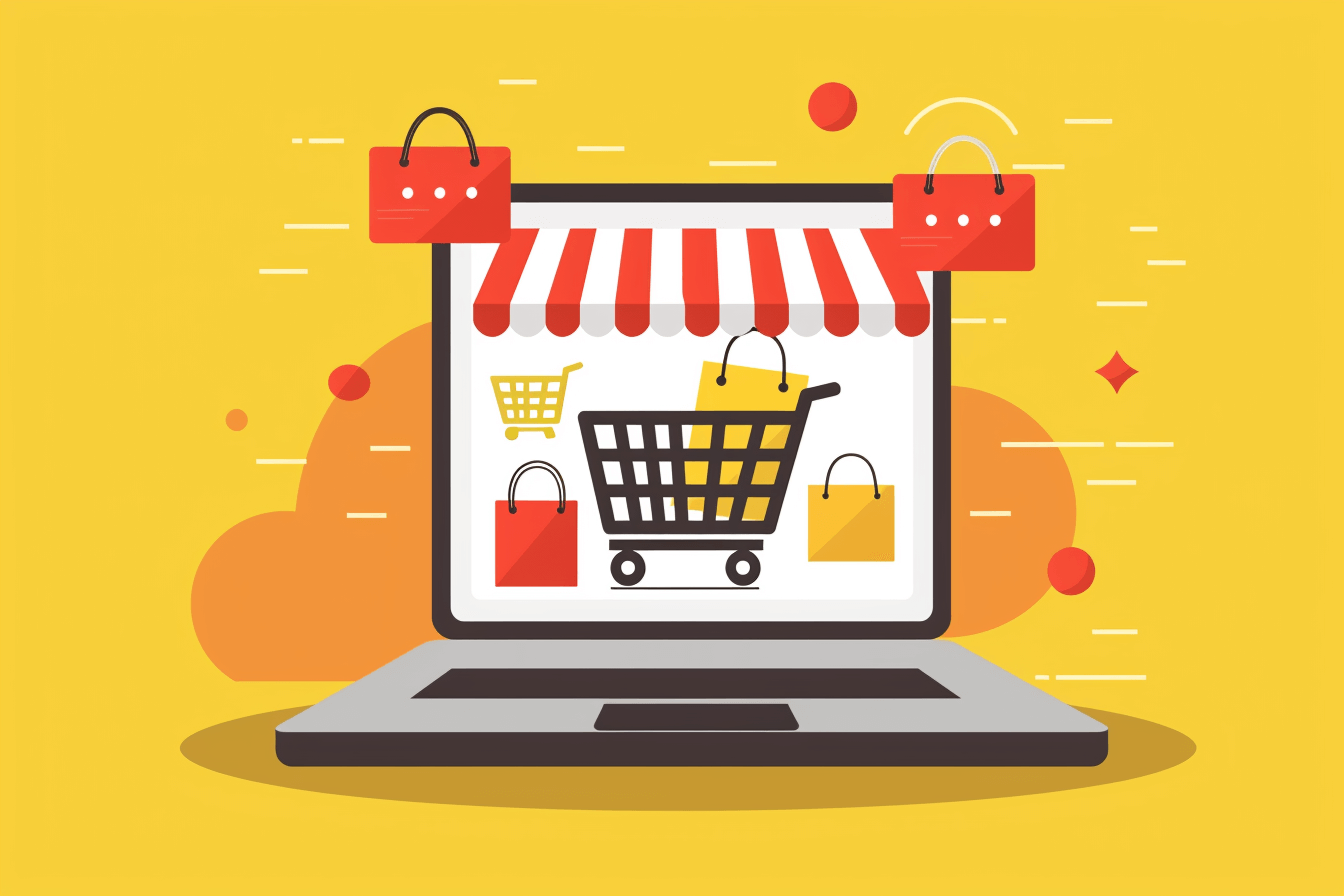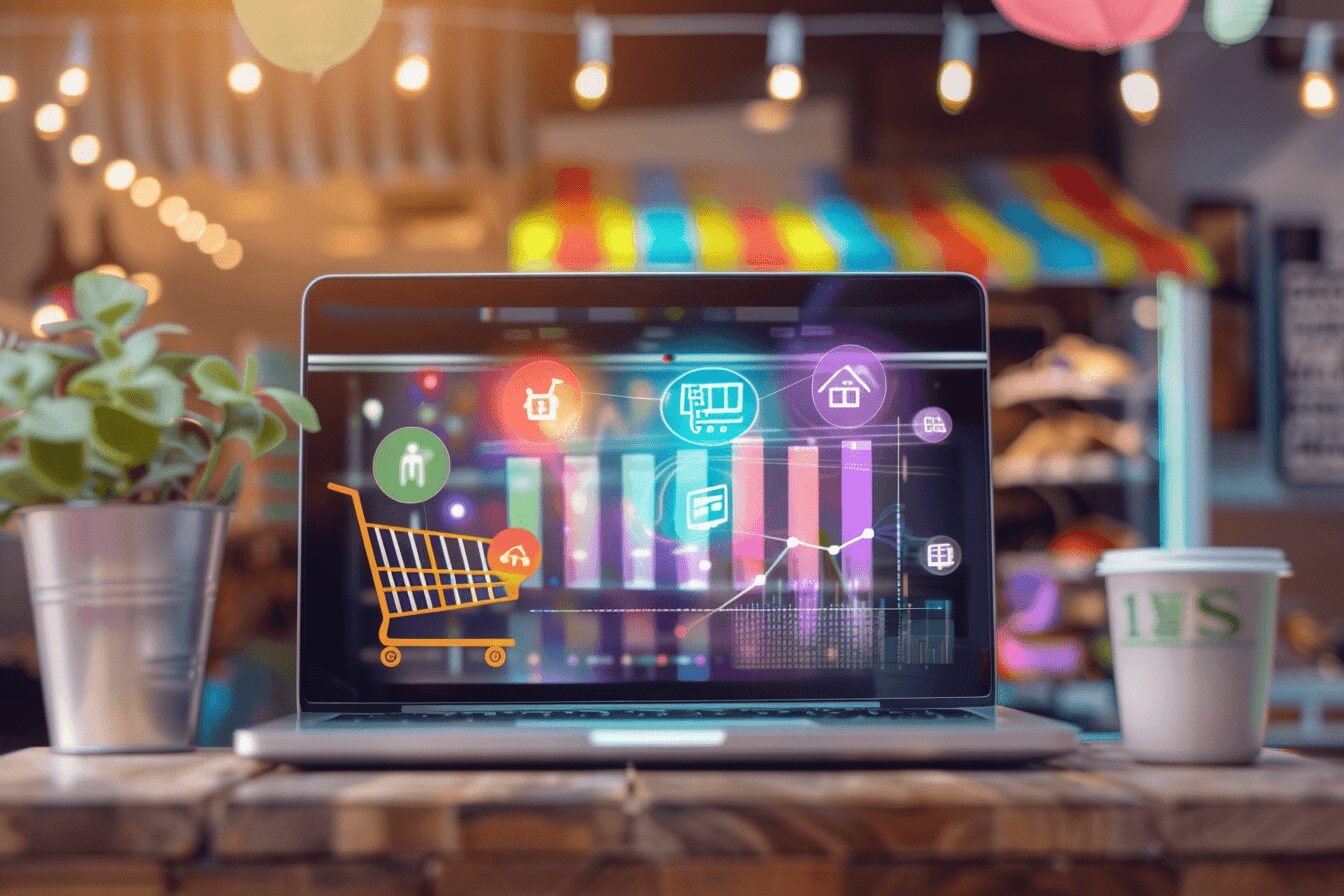Increasing reliance on digital platforms has skyrocketed the prominence of online shopping in our lives, redefining retail in unprecedented ways. With technological advances consistently pushing the boundary of possibilities, let’s explore the exciting prospects for eCommerce. From addressing existing challenges to enhancing the shopping experience, new technologies are poised to transform how we shop online.
This article will delve into the current status of online shopping, the challenges it faces, and the innovative technologies being developed to address these issues and improve the eCommerce landscape. We’ll discuss the implications of artificial intelligence, machine learning, augmented and virtual reality, and blockchain technology on the future of online shopping. Let’s embark on this journey to discover what lies ahead in the exciting world of eCommerce.
TL;DR
- The growth of online shopping, propelled by the COVID-19 pandemic, has transformed the retail industry, leading to increased use of advanced technologies in e-commerce.
- Despite challenges such as cybersecurity issues and lack of tangible product experiences, emerging technologies like AR, VR, AI, and blockchain promise to enhance customer experiences and resolve these issues.
- AR and VR are revolutionizing online shopping experiences by offering consumers interactive and immersive ways to visualize products before buying.
- Blockchain technology could be critical in future e-commerce strategies, providing secure and transparent transactions.
- As e-commerce evolves, businesses must address potential challenges, including data security, logistical operations management, customized customer experiences, and successfully integrating new technologies with their existing platforms.
Understanding E-commerce: An Overview
The world of e-commerce has transformed the retail landscape, impacting how we purchase goods and services online. E-commerce, or electronic commerce, is a business model involving online transactions. Businesses sell goods, services, or information to consumers or other businesses via a website or other venues. Today’s e-commerce landscape offers various online shopping experiences, from large multinational businesses to individual sellers in online marketplaces.
Three primary types of e-commerce transactions include B2C (business-to-consumer), B2B (business-to-business), and C2C (customer-to-customer). B2C e-commerce is the most familiar to the average person, including businesses like Amazon and Walmart. B2B e-commerce involves business transactions, such as a manufacturer selling to a wholesaler or a wholesaler selling to a retailer. C2C e-commerce includes consumer transactions, usually facilitated by a third party like eBay or Etsy.
In the early days of e-commerce, websites were static and offered limited interactivity. However, with technological advancements and internet speed, e-commerce websites have become much more dynamic and interactive, leading to a richer and more personalized user experience. Personalized recommendations, 360-degree product views, AR experiences, live chat support, and easy checkout options are some of the features shaping the future of online shopping.
Moreover, integrating social media networks with e-commerce platforms is also a significant development in the industry. Social commerce is rapidly gaining popularity, with brands selling directly through social media platforms such as Instagram and Facebook. Mobile commerce is another trending aspect, with more and more consumers shopping on their smartphones and tablets.
With the rapid evolution of e-commerce technologies, the future of online shopping is promising. Cutting-edge technologies like artificial intelligence, augmented reality, machine learning, and blockchain are set to elevate customer experiences and push the boundaries of what is possible in e-commerce.
Current Status of Online Shopping
Online shopping has grown exponentially in recent years, with more consumers shopping from the comfort of their homes rather than visiting physical stores. This trend has been further reinforced by the onset of the COVID-19 pandemic, which has temporarily closed many brick-and-mortar establishments. Thus, more and more people have turned to e-commerce as their primary shopping platform. According to a recent report by Adobe, U.S. consumers spent $861.12 billion online in 2020, an increase of 44% year over year.
This surge in online shopping has not only changed consumer habits but also revolutionized the retail industry. Retailers have had to adapt quickly and innovate to keep up with the rapidly changing trends. Many have introduced online shopping options, curbside pick-ups, and contactless delivery services in response.
However, the convenience of online shopping has also come with various challenges. Cybersecurity remains a significant concern, with increasing incidents of online fraud and data breaches. Furthermore, consumers often miss the tangible experience of seeing, touching, and trying products before purchase, which has been a significant barrier to the growth of certain segments such as luxury goods and clothing.
Despite these challenges, the future of online shopping looks promising. Emerging e-commerce technologies are set to address many of these issues while enhancing customer experience. Innovations in AR and VR technology, artificial intelligence, machine learning, and blockchain technology will reshape the online retail landscape in the coming years.
Emerging Technologies Driving E-commerce
The advancement in technology is revolutionizing the ecommerce industry at a rapid pace. Several emerging technologies are impacting online shopping substantially, changing how consumers shop and how online businesses operate.
Artificial intelligence (AI) is among the leading disruptive technologies in e-commerce. AI-based algorithms help online retailers provide personalized shopping experiences to consumers by showing them relevant product recommendations based on their shopping history. Machine learning, a subset of AI, is also becoming instrumental in managing inventory levels, forecasting sales, and reducing operational costs.
Augmented Reality (AR) and Virtual Reality (VR) are the new frontiers in e-commerce. They offer a unique and immersive shopping experience by enabling customers to visualize the products in 3D before making a purchase decision. This not only enhances customer engagement but also reduces product returns and exchanges.
Furthermore, blockchain technology is also making its mark in e-commerce. Its decentralized nature ensures secure transactions, reduces fraud, and enhances customer trust. Coupled with cryptocurrencies, blockchain reduces transaction costs and enables smooth international transactions.
To conclude, the e-commerce industry continues to evolve with technological advancements that improve the shopping experience, streamline operations, and foster growth. Embracing these emerging technologies will be crucial for businesses to remain competitive in the rapidly changing e-commerce landscape.
Artificial Intelligence and Machine Learning in E-commerce
In the ever-evolving world of e-commerce, Artificial Intelligence (AI) and Machine Learning (ML) are playing increasingly dominant roles. These emerging technologies are revolutionizing online shopping, transforming the customer experience, and driving unprecedented growth in the sector. A profound impact on the efficiency and effectiveness of online retail has resulted from AI’s ability to analyse massive amounts of data and ML’s capacity for predictive analysis.
AI shapes and enhances the online shopping experience by providing personalization via product recommendations based on customer preferences and past shopping behaviours. Machine learning algorithms can sift through vast amounts of data, pinpoint customer trends, and deliver highly targeted recommendations. This level of personalization often increases customer engagement, boosts sales, and fosters customer loyalty.
Another significant application of AI and ML in e-commerce is in customer service. Chatbots and virtual assistants powered by AI can handle routine customer inquiries around the clock, improving response time and enhancing customer satisfaction. At the same time, machine learning helps e-commerce platforms identify potential sources of customer dissatisfaction before they become significant issues, allowing for proactive customer service.
AI and Machine Learning are not just changing the way online retailers operate, but also how marketing strategies are formed. With AI tools, businesses can automate their advertising campaigns, optimizing ad content, placement, and timing to maximize engagement and conversion rates. Machine Learning algorithms enhance these efforts by predicting customer responses and adjusting strategies accordingly.
The use of Artificial Intelligence and Machine Learning in e-commerce is just the beginning. With continuous advancements in these technologies, the future of online shopping promises to be even more engaging, personalized, and efficient. The success of e-commerce will increasingly depend on integrating these cutting-edge tech solutions, proving as vital to the sector as the internet itself.
The Impact of Augmented and Virtual Reality on Online Shopping
Augmented Reality (AR) and Virtual Reality (VR) rapidly transform how we shop online. Instead of viewing static images or videos, these technologies allow consumers to have interactive and immersive shopping experiences. AR enhances the real world with computer-generated information, transforming e-commerce into a more dynamic shopping experience. Conversely, VR immerses users into a fully digital world where they can visualize the product in 3D.
From simple product visualizations to engaging, interactive shopping experiences, AR and VR make online shopping more real, interactive and personalized. AR allows consumers to virtually “try on” clothes or “place” furniture in their homes before purchasing. Similarly, VR allows shoppers to navigate virtual shopping aisles like in physical stores. Such immersive experiences boost consumer engagement and confidence and reduce the chances of product returns.
Moreover, AR and VR technologies present enormous branding and marketing opportunities. Brands can deliver innovative, immersive advertisements and promotions, enhancing customer engagement, loyalty, and sales. In addition, these technologies provide consumer behaviour data analytics, which helps retailers better understand consumer preferences, optimize product offerings, and personalized shopping experiences.
However, for all the benefits they offer, AR and VR also present certain challenges. These technologies require significant investment in software and hardware, data management, and technical proficiency. Practically speaking, internet speed and stability also impact the quality of AR and VR experiences. Despite these challenges, it’s undeniable that AR and VR are changing how consumers shop online, pushing boundaries and challenging the status quo.
Blockchain Technology: A Future for E-commerce
Blockchain technology, a decentralized public ledger system that records all transactions across a network, is set to revolutionize various aspects of e-commerce. This technology ensures that all transactions are transparent, thereby creating trust between buyers and sellers. Moreover, blockchain allows for faster, more secure transactions by eliminating the need for intermediary parties such as banks.
The application of blockchain technology to e-commerce goes beyond just transactions. One example is supply chain transparency. For online shoppers who are particularly conscious about the origins of their purchases, blockchain can provide verifiable proof of a product’s journey from manufacturer to end consumer. Thus enhancing customer experience and enabling ethical and sustainable business practices.
For e-commerce businesses, blockchain could potentially reduce operating costs. By streamlining payment and logistics processes, blockchain can minimize delays and inefficiencies associated with traditional transaction methods. Additionally, blockchain can aid in preventing fraud, a persistent problem in the e-commerce sector, by recording and verifying all transactions.
However, while blockchain promises numerous benefits, its implementation within e-commerce is still in a nascent stage. Many challenges, such as scalability, regulatory uncertainties, and lack of widespread understanding of the technology, lie ahead. Nonetheless, its potential impact on e-commerce continues to pique interest.
Integrating blockchain technology in e-commerce could foster greater efficiency, transparency, and security as we move towards the future. As such, it’s poised to be a significant player in shaping the future landscape of online shopping.
Potential Challenges and Solutions for the Future of E-commerce
As e-commerce evolves with advancing technologies, it also faces new potential challenges that could impact retailers and consumers alike. One primary challenge is maintaining data security. With increasing online transactions, maintaining a secure environment for customers to shop without fear of data breaches is paramount. Advanced technologies can both exacerbate and combat this issue, with innovations in cyber security advancing at the same pace as potential threats. As a solution, businesses must invest in continuous security upgrades, secure payment systems, and comprehensive user data protection services.
Another challenge is the management of logistical operations. With emerging technologies potentially drastically increasing the scale and speed of e-commerce, businesses will be required to manage an increasing amount of inventory and orders accurately and efficiently. The widespread use of AI, machine learning, and robotics in warehouses may solve these challenges. These technologies can automate and streamline processes, improve order accuracy, reduce labour costs, and enhance overall efficiency.
Furthermore, the future of e-commerce may also see a challenge in maintaining a personalized customer experience in an increasingly automated environment. To provide a solution to this, online retailers can apply AI technology to analyze customer behaviour, tastes, and trends and utilize this information to offer personalized product recommendations and shopping experiences.
Lastly, businesses may encounter hurdles while integrating new technologies into their existing platforms. Transitioning to a new technological framework is often a complex, time-consuming, and costly process. Developing simple and affordable integration solutions and dedicated support from technology providers will be fundamental in overcoming this challenge.
Conclusion
In conclusion, emerging technologies will undoubtedly shape the future of online shopping and e-commerce. As AR, VR, Artificial Intelligence, and Machine Learning continue to advance, so does the potential for a more immersive, personalized, and efficient shopping experience. However, with the many opportunities come new challenges, specifically in data security, logistics, and integration into existing platforms. Retailers must stay ahead of these concerns, continually investing in developing and applying these new technologies while ensuring a safe and satisfying customer experience.
With so much development and progression at hand, it’s an exciting time for the e-commerce industry. The significant growth and success of online shopping in recent years is a testament to its potential, and with these emerging technologies, the sky is the limit. Looking ahead, one thing is certain – e-commerce will continue to transform, innovate, and adapt, all thanks to technology.










